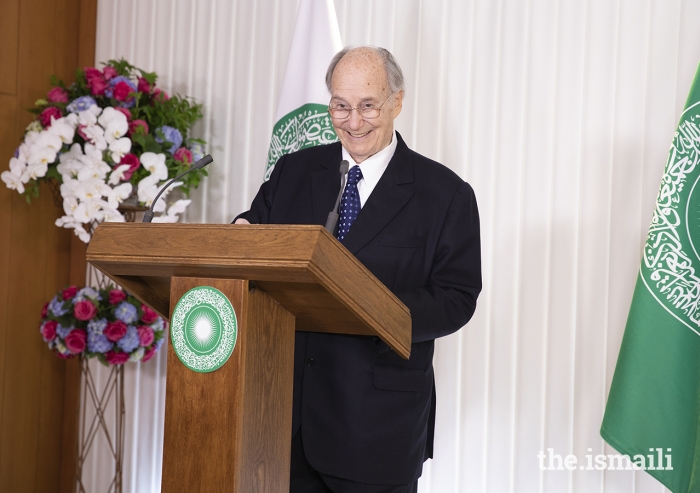Royal Toledo foundation award ceremony
Bismillahi Rahmanir Rahim
Your Majesty,
Mr. Chairman and Distinguished Members of the Foundation Board,
Excellencies,
Ladies and Gentlemen:
On behalf of all the award recipients, including the Aga Khan Trust for Culture, it is my privilege to thank the Royal Toledo Foundation for its generosity in recognizing their efforts as contributing to the preservation of historic, cultural and artistic heritage.
We are particularly honoured by the presence of Your Majesty among us this evening.
Some may ask if preserving the material evidence of our past influences the future positively, helps us live together in peace, and improve the quality of life.
I believe the answer is a confident yes. But there is a paradox.
In the developing, including the Muslim, world, many historic cities are home to large populations who live in extreme poverty. They may contain some of the greatest treasures of Muslim architecture, yet many of their inhabitants lack even the most basic services. They live on the margins of society and feel trapped in a cycle of poverty.
The risk is that when hope fades, extremist ideologies feed on the despair that is born from limitless poverty. Thus, a recent UN Development Programme study in Latin America reports that a majority of people surveyed would support authoritarian rule if it delivered economic progress.
This confirms a universal tendency. Whatever their faiths or value systems, the primary, daily concern of peoples everywhere is their quality of life.
Indeed, the revelation of Islam - my faith - looks upon freedom from hunger, provision of appropriate shelter and clothing, security against fear for one's safety, good health, learning and wisdom, and generation of wealth as a blessing to strive for, and to share in the creation of an equitable order of peace and harmony.
This explains my own role, as the hereditary Imam - the spiritual leader - of the Shia Ismaili Muslims, in development activities through the agencies of the Aga Khan Development Network, or the AKDN.
Like the Muslim Ummah as a whole, the worldwide Ismaili community that I lead is immensely pluralistic, culturally and linguistically. In our experience and conviction, the creation of a humane, socially supportive built environment is critical to people's quality of life.
For this reason, the Historic Cities Support Programme, a component of the Aga Khan Trust for Culture, is not only concerned with saving buildings or historic districts for future generations. It seeks to go beyond restoration to creating mechanisms that contribute to real, measurable improvement in the quality of life in rural and urban areas, also enabling their inhabitants thereby to look after their cultural assets.
This is the goal of the multi-programme capacity-building strategies which the AKDN deploys to help the residents of historic cities or areas, whether this be the Silk Road, or Kabul and Herat in Afghanistan, Aleppo in Syria, Mopti in Mali, Zanzibar, or Cairo, the city that my forefathers, the Fatimid Imam-Caliphs of Egypt, founded more than a thousand years ago. In all such places, rehabilitation of cultural heritage is supported by the work of AKDN agencies specialising in microfinance, health, education, water and sanitation and promotion of economic enterprise.
We have evidence to believe that the processes we have been developing and testing for the past 20 years have the potential to become self-sustainable. The expertise and investment that they bring to historic cities, or indeed the Silk Road, are helping to create jobs and economic opportunities, for example, through tourism and by rendering ancient crafts and skills into marketable products and services.
At the same time, I believe conservation can play a central role in helping different civilizations understand each other, to appreciate how mutually enriching their historic interactions have been, and the contribution of each to the common heritage of humanity.
Undeniably, there have been periods in history when the genius of different civilisations was perceived as a threat. In recent times also, we have witnessed attempts by antagonistic social, cultural and religious forces to impose their own norms on vulnerable groups.
Be that as it may, the reality is that our world is pluralistic and multi-cultural, and destined to remain so.
Ought we not, then, to focus our attention on periods of history when pluralism was happily embraced? May we not learn thereby the need to nurture what I have recently called a cosmopolitan ethic? For this is the foundation of a merit-based civil society capable of harnessing the best in all walks of life from all groups of people. This is the only way to manage, and build on, pluralism, the critical test of democracy anywhere.
This brings me to Toledo which has so successfully preserved, over many centuries, the evidence of its three-fold culture: magnificent churches, synagogues and mosques.
This was an era when each of these cultures, Christian, Jewish and Muslim, retained its independent identity while all worked and came together in a glorious intellectual and spiritual adventure. The legacy was a truly enabling environment conducive to prosperity, harmony, scientific discovery, philosophical insights and artistic flowering - all the defining features of a thriving civilisation.
I believe, therefore, that the past has the potential to inspire the future positively, and in the wisdom of investing in its protection, particularly the protection of cultures under threat.
The Royal Toledo Foundation deserves admiration for its commitment to keeping alive this spirit of Toledo.
Thank you.







